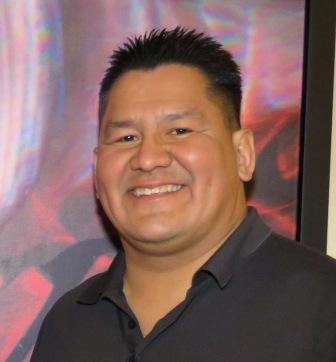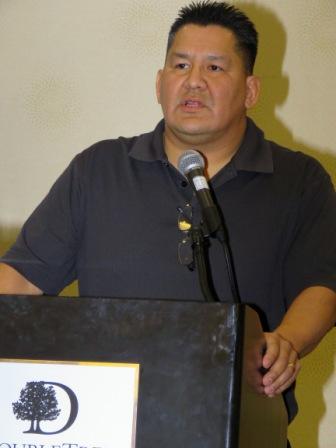by John Copley
(ANNews) – Mike Deranger is President of Derantech Welding Ltd. and Derantech Industries Inc. He is a 44 year old businessman with an abundance of skills and a proven track record as a man who knows how to get things done. When introduced to the podium at the November 24-25 Alberta ASETS Forum, where he would offer insight into youth development and announce the upcoming March 2016 Pathways Conference, he stated: “My Indian name is Northern Runner; my father is Dene from Lake Athabasca and my mother is Blackfoot from the Peigan Nation in southern Alberta. I was born in Edmonton but have spent much of my life in Ft. McMurray.”
Deranger is a practiced and articulate speaker whose main purpose in life is to enhance the positive progression of Aboriginal youth, and to help ensure that they have the opportunities to compete for skilled jobs, maintain long-term careers and have equal opportunities in all facets of life. To do that, he speaks with them, he teaches them, he trains them and he encourages them.
“I work in business development and skilled trades,” he explained to an attentive afternoon audience. “It’s not an easy road; a lot of companies utilize our people strictly for labor work, cleaning rooms, checking batteries. It’s very discouraging to see that we are relegated to non-essential work and don’t get offered the opportunities to participate more meaningfully so we can build careers and develop positive futures for our young people. Many of our people live in horrible conditions and face unpleasant daily ordeals and it has become increasingly difficult for our young people.
“Our youth are fully aware of what’s going on in society; they’re technologically advanced and they see how other people live and prosper, yet they can’t move out of the same old rut because there is a continuing lack of opportunity. This needs to change and I believe one of the ways we can change it is through skills development. This is something I’ve been involved with since I was a kid. I began my apprenticeship when I was 20 years old; I had my journeyman ticket when I was 25. I started my company when I was 32 and for the past 12 years I’ve been training young people. It is something I really enjoy and want to keep doing.
“I believe in our youth. I believe in what they’re doing and how they’re trying to get ahead. I see that in my company too – I bring them in to train them and they’re easy to train and the work they do is good. I also notice that today our young people are proud; they’re getting back in touch with their culture through technology. They work together and network with each other. We have a really strong generation of young people coming up in the next little while, and it’s our responsibility, all of us in this room, to give these young people an opportunity to succeed at every possible avenue that we can.
“As Indigenous people we all know that no matter what we do or what direction we go, it’s an uphill battle. We have to stick together, we have to work together – and we are doing that. There are so many young people out there today who want to do something, they just need an opportunity and they can succeed. I believe in career development and I believe that our young people can do more than sweep floors, shovel dirt and clean rooms. They can be managers; they can be business owners and entrepreneurs. They can also enrol in any number of outstanding trades; there is always a need for an electrician, a plumber, a welder, a steamfitter, a mechanic or as we heard earlier today, heavy equipment operators. I’ve trained a lot of young people in my business since 2007 and some of them are still under 30 years of age and they are supervisors and managers and doing really well. We need to see this trend continue.
“We have a tremendous resource here in Alberta – 230,000 young people here – Indigenous people and more than 62,000 in Edmonton. Since 2011 the high school graduation rate has doubled from 25 to 50 percent and our Indigenous workforce too has grown by 150 percent since 2011.
“We need to look more towards skilled trades development because even though these numbers are good, the major players we are trying to encourage to employ our young people don’t hire one or two people at a time – they hire 200 or 500 or 1000, so though we are out there we’re not a part of the big picture – yet. The numbers of skilled trades people just aren’t there right now and that’s why we need to start looking more seriously at skilled trades development.
“My long-term goal is to see on-going development. If we begin to train our young people now, say from 18 to 25 year olds, they can compete in the next 25 years of projects. We can no longer overlook the fact that this young, vibrant and growing population needs to be able to compete for employment and advancement on a level playing field. We have a role play here and we need to be a little more aggressive in our approach. We still have a lot of social problems out there, just as we have a growing number of high school graduates and others who are entering or completing their post secondary education.
“We still have high rates of suicide, high numbers of incarceration and something that is dear to us all – missing and murdered Aboriginal women. These problems will continue to escalate if we don’t do something. We need to connect with our young people to find a way that we can work together with them to achieve positive goals for everyone. If we don’t begin to capitalize on the strengths of our youth, someone else will and it likely won’t entail skilled labour or healthy pay cheques. Some reports say the gap between Aboriginal and non-Aboriginal people is not closing, but in fact is widening. So while some progress is being made, Aboriginal Canadians are not on track to close the gap by 2022, the target date set by the National Aboriginal Economic Board in 2012.
“It all comes down to improving the standard of living for our people; if we can do that, success for our young people will follow. The numbers indicate that the employment gap has closed considerably since 2006; it is now 9.7 percent higher than most Canadians but just a few years ago it was 22 per cent higher. I believe in our youth and these improving stats are proof that they are moving ahead and they are making progress. The work we are doing in this room today will play out within the next few years; something good has to come of it and I truly believe that it will.”
Mike Deranger also announced the upcoming 2nd Annual Pathways 2016 Gathering of Nations Youth for the Trades National Conference, an event that will take place at the Fantasyland Hotel in West Edmonton Mall from March 1-3, 2016.
“Skilled trades’ development is something I strongly believe in; it is very important for our youth because it provides a viable, strong career objective. It provides our youth and our communities with an opportunity for an improved standard of living and long-term sustainable development. It also gives employers the opportunity to come up with new and innovative employment practices so they will be able to capitalize on the skills of our young workers.
“As a business owner and employer involved in mechanical maintenance I understand the need for manpower and the growing need for apprenticeship development. Indigenous youth are an important and untapped resource of skilled trades’ labour that can be trained for all kinds of projects across Canada over the next 25 years – including technology and renewable energy.
“My goal is to help empower our youth and eventually put them to work in trades related fields. If we can accomplish this then it’s just a matter of time before we see the infrastructure in our communities begin to blossom. Our young people will be the leaders, builders and entrepreneurs of tomorrow; we just need to make sure they get the opportunities today.”




Bullshit, he’s just like the sell-outs in my country Australia. Water is life, yet he will get away with it because of western culture.
Indigenous people are not alone. Everyone is being screwed by the Canadian Empire. Québéquois, Westerners, Northerners, Newfoundlanders. Who isn’t getting screwed? The people who run everything in Ottawa, Toronto, and Westmount. The econazis at the CBC tell everyone what to think and do. The bureaucrats feather their nests with everyone’s money.